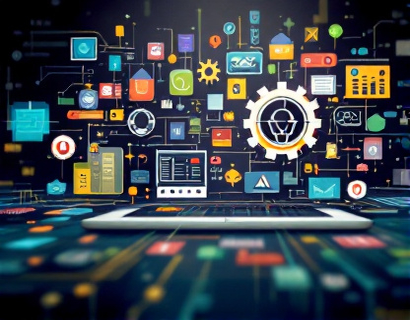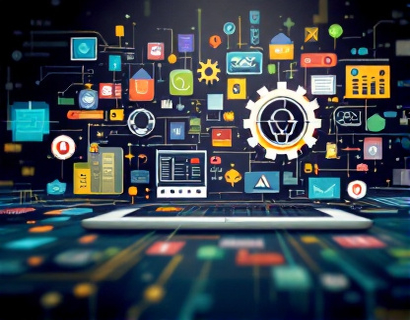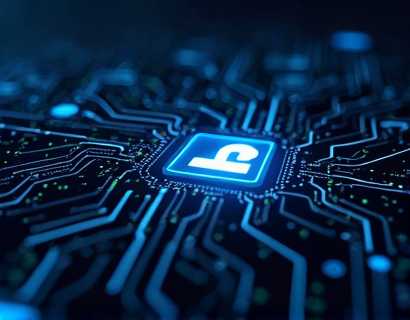Seamless AI and Blockchain Integration: Essential Resources for Business Digital Transformation
The integration of Artificial Intelligence (AI) and blockchain technology represents a pivotal shift in how businesses operate and innovate in the digital age. This integration offers unprecedented opportunities for enhancing operational efficiency, securing data, and unlocking new growth avenues. For business leaders navigating this complex landscape, having access to comprehensive resources and actionable strategies is crucial. This guide aims to serve as an essential resource, providing insights and practical approaches to seamlessly integrate AI and blockchain, thereby streamlining operations and driving digital transformation.
Understanding AI and Blockchain
Before delving into the integration process, it's essential to understand the fundamental concepts of AI and blockchain. AI refers to the simulation of human intelligence processes by machines, particularly computer systems. These processes include learning (the acquisition of information and rules for using it), reasoning (using rules to reach approximate or definite conclusions), and self-correction. AI technologies such as machine learning, natural language processing, and computer vision are transforming industries by automating tasks, providing predictive insights, and enhancing decision-making.
Blockchain, on the other hand, is a decentralized digital ledger technology that records transactions across multiple computers in such a way that the registered transactions cannot be altered retroactively. This technology ensures transparency, security, and immutability, making it ideal for applications requiring trust and traceability. Blockchain's distributed nature eliminates the need for intermediaries, reducing costs and increasing efficiency.
Benefits of AI and Blockchain Integration
The synergy between AI and blockchain creates a powerful combination that can address some of the most pressing challenges in business operations. Here are some key benefits of integrating these technologies:
- Enhanced Security: Blockchain's inherent security features, combined with AI's advanced threat detection capabilities, create a robust defense mechanism against cyber threats. AI can monitor blockchain networks for unusual activities and potential vulnerabilities, while blockchain ensures that all transactions are recorded and verified, reducing the risk of fraud.
- Improved Efficiency:
- Data Integrity and Transparency:
- Smart Contract Automation:
- Supply Chain Optimization:
AI can automate and optimize various processes within a blockchain network, such as smart contract execution and data validation. This automation reduces manual errors and speeds up transaction processing times. For instance, AI algorithms can predict and optimize resource allocation, ensuring that blockchain resources are used efficiently.
Blockchain's immutable ledger ensures that data remains unaltered and transparent. AI can further enhance this by providing real-time analytics and insights into the data stored on the blockchain. This combination ensures that all stakeholders have access to accurate and up-to-date information, fostering trust and collaboration.
Smart contracts, self-executing contracts with the terms directly written into code, can be significantly enhanced by AI. AI can analyze and interpret complex contract terms, predict outcomes, and automate the execution of contractual obligations. This reduces the need for intermediaries and speeds up business processes.
Integrating AI and blockchain can revolutionize supply chain management. AI can predict demand, optimize inventory levels, and identify bottlenecks, while blockchain ensures transparent and secure tracking of goods from origin to destination. This combination reduces costs, improves delivery times, and enhances customer satisfaction.
Challenges in AI and Blockchain Integration
While the benefits are compelling, integrating AI and blockchain also presents several challenges that businesses must address:
- Technical Complexity:
- Scalability Issues:
- Regulatory Uncertainty:
- Data Privacy Concerns:
Both AI and blockchain are complex technologies that require specialized knowledge to implement effectively. Businesses need to invest in skilled personnel or partner with experts to navigate the technical intricacies.
Current blockchain technologies face scalability challenges, particularly in terms of transaction throughput and processing speed. Integrating AI can help mitigate some of these issues, but it requires careful planning and the use of advanced AI algorithms.
The regulatory landscape for both AI and blockchain is still evolving. Businesses must stay informed about legal requirements and ensure compliance to avoid penalties and reputational damage.
While blockchain provides transparency, it can also raise privacy concerns, especially when sensitive data is involved. AI can help anonymize data and ensure compliance with data protection regulations, but this requires robust data management strategies.
Actionable Strategies for Integration
To successfully integrate AI and blockchain, businesses should follow these actionable strategies:
1. Assess Current Infrastructure and Needs
Begin by conducting a thorough assessment of your current IT infrastructure and identify areas where AI and blockchain can add value. Determine specific pain points and objectives, such as enhancing security, improving efficiency, or optimizing supply chains. This assessment will guide the selection of appropriate technologies and solutions.
2. Build a Skilled Team or Partner with Experts
Given the technical complexity, it's crucial to assemble a team with expertise in both AI and blockchain. If building in-house, consider hiring professionals with a background in computer science, data science, and blockchain development. Alternatively, partner with consultants or technology providers who specialize in AI and blockchain integration.
3. Start with Pilot Projects
Instead of a full-scale implementation, start with pilot projects to test the integration of AI and blockchain in a controlled environment. This approach allows you to identify and address potential issues, refine processes, and demonstrate value before a broader rollout. Pilot projects can focus on specific use cases, such as supply chain tracking or smart contract execution.
4. Leverage AI for Blockchain Optimization
Use AI to optimize blockchain operations. For example, AI can analyze blockchain data to identify patterns and anomalies, predict network congestion, and optimize resource allocation. Machine learning algorithms can also enhance smart contract functionality by providing predictive analytics and automated decision-making.
5. Ensure Data Privacy and Security
Implement robust data privacy and security measures. Use AI to monitor blockchain networks for suspicious activities and potential security breaches. Employ data anonymization techniques to protect sensitive information while maintaining the transparency benefits of blockchain.
6. Stay Compliant with Regulations
Stay informed about regulatory requirements and ensure that your AI and blockchain integration complies with relevant laws and standards. This includes data protection regulations, financial regulations, and industry-specific guidelines. Regularly review and update your compliance strategies to adapt to changing regulations.
7. Foster a Culture of Innovation
Encourage a culture of innovation within your organization. Provide training and development opportunities to help employees understand and embrace AI and blockchain technologies. Foster collaboration between different departments to drive creative solutions and continuous improvement.
8. Monitor and Evaluate Performance
After implementation, continuously monitor and evaluate the performance of your AI and blockchain integration. Use key performance indicators (KPIs) to measure the impact on efficiency, security, and other objectives. Gather feedback from users and stakeholders to identify areas for improvement and make data-driven decisions.
Tools and Resources for Integration
Several tools and resources can facilitate the integration of AI and blockchain:
- Blockchain Platforms:
- AI Development Frameworks:
- Cloud Services:
- Consulting Firms:
- Open Source Projects:
Popular blockchain platforms like Ethereum, Hyperledger, and Corda provide the foundation for building decentralized applications and smart contracts. These platforms often offer development frameworks and tools to integrate AI functionalities.
Frameworks such as TensorFlow, PyTorch, and Scikit-learn are essential for developing and deploying AI models. These frameworks can be integrated with blockchain to enhance smart contracts and data processing.
Cloud providers like AWS, Google Cloud, and Microsoft Azure offer a range of services for AI and blockchain integration, including computing power, storage, and managed services. These platforms simplify deployment and scaling.
Consulting firms specializing in AI and blockchain can provide valuable expertise and guidance. They can help navigate the integration process, address technical challenges, and ensure compliance with regulations.
Leverage open source projects and communities to access pre-built solutions and best practices. Projects like Open Ledger Protocol and AI blockchain libraries can accelerate development and reduce costs.
Case Studies and Success Stories
Examining real-world examples can provide valuable insights into the successful integration of AI and blockchain:
One notable example is the use of blockchain and AI in the supply chain industry. Maersk and IBM collaborated on a blockchain-based platform called TradeLens, which uses AI to optimize shipping routes, reduce delays, and enhance transparency. The platform has significantly improved efficiency and reduced costs for participating companies.
Another example is the financial sector, where JPMorgan Chase has developed an AI-powered blockchain platform called CODI (Contract Digitization Initiative). CODI automates the process of creating and executing complex financial contracts, reducing manual errors and processing times. The integration of AI helps in analyzing and optimizing contract terms and execution.
These case studies demonstrate the potential of AI and blockchain integration to transform industries by enhancing efficiency, security, and innovation.
Conclusion
Integrating AI and blockchain represents a transformative opportunity for businesses looking to stay competitive in the digital age. By leveraging the strengths of both technologies, companies can achieve unprecedented levels of efficiency, security, and innovation. While the journey involves challenges, the provided strategies and resources can guide businesses through the process. Embracing this integration not only streamlines operations but also opens up new growth opportunities, ensuring long-term success in a rapidly evolving digital landscape.










































